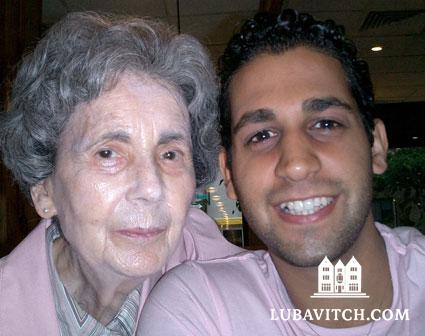(lubavitch.com) It is nearly 70 years since the start of the systematic, state-sponsored murder of over six million European Jews. Today, with anti-Semitism on a global rise and Holocaust deniers stridently espousing their hate, survivors are facing their own enemy: loneliness and depression.
“Several years ago we realized that survivors, particularly those living in Manhattan, were isolated and often without friends or family,” explains Sheva Tauby, co-director of Ivolunteer. Tauby and her husband Tzvi, serve as Chabad representatives to Manhattan and are the founders of this visitation program for homebound Holocaust survivors. The couple organizes volunteers–50 are currently involved–to visit survivors each week for companionship and aid.
“To have someone come and listen to their experiences is tremendous,” shares Tauby. “They survived and gave us a future. The least we can do is be there for them.”
In Holocaust Survivors and Immigrants: Late Life Adaptations, author Boaz Kahana reports on the current state of survivors. Not surprisingly, he found that survivors, particularly those who currently reside in the United States, have significantly higher levels of isolation, low morale, and depression than their contemporaries.
As they age, health problems accrued during the war years are becoming more pronounced. In addition, a large percentage of survivors do not have family. “Many survivors’ bodies were simply too damaged to bear children,” explains Tauby. “And countless others who felt that the world was too evil to bring children into.” Those that were able to have families were often very hard on them: now their children have distanced themselves.
That is where Ivolunteer steps in. “We become case managers by default,” says Tauby. Volunteers are trained to recognize when outside help, from social service agencies, physicians, or cleaning services, is needed. In one extreme case last month, a volunteer making her weekly visit discovered that her survivor had died. With no family to organize a funeral, Ivolunteer took care of all the arrangements.
Survivor Ruth Gans and her family tried to obtain visas for America in the late 1930s. When that failed, Gans left Berlin and moved to Holland where she spent the war years hiding on a farm. Today, says the 88-year old former Montessori teacher, life is “very uncomfortable and aging is hard. Living as a survivor is so difficult, not having family or friends.”
Enter Daniel Gabbay. “It is a wonderful feeling knowing that I can call him to talk, or for help in difficult situations,” says Gans. “He always has time for me, even when others don’t. He is such a good friend.”
“Sheva set Ruth and me up several years ago,” says the 24-year old Gabbay. “Today, she is one of my very close friends.” Gabay and Gans visit once a week for several hours. Sometimes they go to a local diner or for a walk around the neighborhood. But usually, they just talk. “I tell her about the girls I am dating, school, or my work. I value her opinion and she is usually right. We talk about everything that is going on in our lives.”
“Until the age of 15, I had a good life,” recalls Gans. “I went to school and had many friends and so many relatives. Now they are all gone.” While Gabay looks to Gans for relationship or personal advice, she relies on him to keep her abreast with today’s world. “When I was a child, we had Beethoven and Mozart. We learned to play the piano and guitar (not the electric guitar!). Today the music is not music, it is just screaming. It is not attractive.”
“I don’t always agree with her,” laughs Gabay. “And she certainly doesn’t always agree with me. It makes for really good conversation.”
When volunteers are not visiting with seniors, the Ivolunteer staff is busy taking care of them. The Taubys study Chasidic philosophy with volunteers at Starbucks, host monthly Shabbat dinners throughout Manhattan, and throw holiday parties for volunteers and survivors. Despite the constant enthusiasm the directors try to generate, Tauby insists that the volunteers’ motivation derives mainly from the survivors themselves.
“She is like the grandma I never had,” declares Jamie Goodwin of her survivor-friend, Margot. “Once a week we sit down, talk about everything. Sometimes we go for manicures (she loves getting her nails done) and we often play Scrabble (her favorite game in the world—I always have to ask her for words).
“I have learned not to take things for granted. Because she overcame the terrible events in her life and bravely faces the horrible Parkinson’s she has now, I have learned not to sweat the small stuff.”
Goodwin has also learned a bit more about herself through her year of service with Ivolunteer. “I grew up reform,” says the Marymount Manhattan senior. “Through Shabbat dinners with the other volunteers and meeting the broader Chabad community, I have started keeping Shabbat and kosher.” Rabbi Tauby believes that young professionals living in the city often arrive without a Jewish address.
“Ivolunteer becomes their Jewish identity in the city. This is where they hang out with other Jews.”
Goodwin’s growth “all started from being involved with this program. Through them,” she says, “I have grown into myself.”
For Gabbay, who is currently completing his degree in psychology, his visits with Gans have taught him “more than any textbook could ever offer. These are life lessons,” he asserts.
“If anyone has the ability to give an older person this unbelievable pleasure of an hour’s visit, they must,” he says. But with all the joy the older Gans experiences, Gabbay is adamant about one thing.
“I definitely get more out of it than her. She is so important to me. She is truly alive.”

Be the first to write a comment.